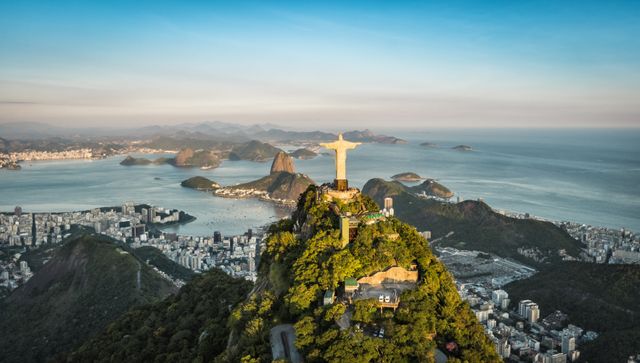4.1.2
Specialisation & Trade
Specialisation and Trade
Specialisation and Trade
Specialisation relies on trade because economies need to buy the things that they have not specialised in from other countries. Finland produces a lot of paper, but it may need to buy cars from a country like Germany that has specialised in car production.


Specialised economies need trade
Specialised economies need trade
- Specialisation means countries often stop making products they need, to focus on producing the products they are better at.
- As a result, trade must happen with other countries, and an efficient exchange system is needed.
- Money is often used as this medium of exchange because everyone values money.
Comparative Advantage
Comparative Advantage
Free trade can allow countries to specialise in the goods they are most efficient at producing. Trade means that they can buy some goods from other countries, rather than producing them themselves.
,h_400,q_80,w_640.png)
,h_400,q_80,w_640.png)
Opportunity cost of production
Opportunity cost of production
- If a country produces sugar, it has an opportunity cost of production.
- The labour and capital used to make sugar cannot be used to make wheat at the same time.
- E.g. if Brazil can produce a lot of sugar cane per acre but not much wheat, and the US can produce a lot of wheat but not sugar cane, then the US has a lower opportunity cost of producing wheat than Brazil.
- This can be shown using production possibility frontiers (PPFs).


Comparative advantage
Comparative advantage
- The US has a comparative advantage in producing wheat.
- Brazil has a comparative advantage in producing sugar cane.
- If both countries could specialise in producing the goods they had a comparative advantage in, then:
- The total world output of goods will rise.
- Brazil and the US can trade wheat for sugar cane, and they both benefit.
- Think of comparative advantage as what a country is least bad at - they all have to produce something!


Absolute advantage
Absolute advantage
- A country has an absolute advantage in producing a good over another country if it uses fewer resources to produce that good.
- E.g. if Saudi Arabia can produce corn and oil more efficiently than the US, but can only produce 100 barrels of oil or 25 bushels of corn, the opportunity cost for Saudi of producing one barrel of oil is the loss of 0.25 bushels of corn.
- If the US lost a bushel of corn by producing one barrel of oil, then the US has a comparative, but not absolute advantage in corn.


Costs of international trade
Costs of international trade
- Negative externalities such as pollution from freight.
- Risk of structural/regional unemployment because employers relocate.
- While international trade may benefit skilled workers, it can be bad for low-skilled workers.
- Low-skilled workers in developed countries compete against extremely low wage workers worldwide, which is unsustainable.
1Exploring Business
1.1Features of Business Organisations
1.2Organisation of Businesses
1.3Business Environment
1.3.1External Influences
1.3.2Political & Legal Change
1.3.3Economic Environment
1.3.4Social & Technological Environment
1.3.5Lifestyle & Technological Environment
1.3.6Corporate Social Responsibility
1.3.7The Competitive Environment
1.3.8Innovation
1.3.9Risk & Uncertainty
1.3.10Porter's Five Forces
1.3.11SWOT Analysis
2Marketing Campaigns
2.1Marketing
3Business Finance
3.1Sources of Finance
3.2Financial Planning
3.3Financial Statements
4International Business
4.1Globalisation
4.2International Business
4.3International Economic Environment
4.4Factors Affecting International Business
5Principles of Management
5.1Management & Leadership
5.2Theories of Motivation
6Business Decision Making
6.1Business Principles & Practices
6.2Quality Management
6.3Human Resources
6.4Documents & Business Decisions
Jump to other topics
1Exploring Business
1.1Features of Business Organisations
1.2Organisation of Businesses
1.3Business Environment
1.3.1External Influences
1.3.2Political & Legal Change
1.3.3Economic Environment
1.3.4Social & Technological Environment
1.3.5Lifestyle & Technological Environment
1.3.6Corporate Social Responsibility
1.3.7The Competitive Environment
1.3.8Innovation
1.3.9Risk & Uncertainty
1.3.10Porter's Five Forces
1.3.11SWOT Analysis
2Marketing Campaigns
2.1Marketing
3Business Finance
3.1Sources of Finance
3.2Financial Planning
3.3Financial Statements
4International Business
4.1Globalisation
4.2International Business
4.3International Economic Environment
4.4Factors Affecting International Business
5Principles of Management
5.1Management & Leadership
5.2Theories of Motivation
6Business Decision Making
6.1Business Principles & Practices
6.2Quality Management
6.3Human Resources
6.4Documents & Business Decisions
Unlock your full potential with Seneca Premium
Unlimited access to 10,000+ open-ended exam questions
Mini-mock exams based on your study history
Unlock 800+ premium courses & e-books